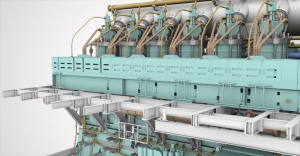


(Posted on 31/03/23)
Technology group Wärtsilä has introduced a new radical derating retrofit solution – Wärtsilä Fit4Power - to extend the emissions-compliant lifetime of merchant vessels by providing the existing two-stroke fleet with leaner, healthier and more optimised engines.
This new advanced retrofit solution enables ship owners to reduce the bore size of two-stroke engines by 25% while significantly improving combustion efficiency, which in turn reduces both fuel consumption and greenhouse gas emissions. For owners, this will improve the efficiency of their existing fleet, ensuring compliance with Carbon Intensity Indicator (CII) regulations, and futureproofing assets against future environmental measures.
Wärtsilä 2-Stroke Services successfully completed the pilot installation of Wärtsilä Fit4Power onboard a ship with large-bore two-stroke main engine last year. The results proved that a vessel with this kind of main engine, that is now oversized for today’s operating patterns, can save 2,000 tonnes of fuel and reduce at least 6,000 tonnes of CO2 emissions annually thanks to this retrofit solution. Fit4Power received certificate of product design assessment from American Bureau of Shipping (ABS) in 2022.
Ole Pyndt Hansen, Managing Director at Wärtsilä 2-Stroke Services, said: “With the IMO’s CII now in force, operators of merchant vessels need cost-effective solutions that can assure the long-term fitness of their existing fleet. Radical derating gives mid-life engines a new lease of life, with a power output and emissions profile that can take them through the early years of CII and prepare them for the most efficient use of new fuels needed to reach later emissions targets.”
While conventional derating merely tunes engines for operation at lower loads, Wärtsilä Fit4Power involves reducing the bore diameter of engine cylinders and introducing a new combustion chamber design, enabling the engine to run at optimal loads and with state-of-the-art fuel efficiency. The higher compression ratios and firing pressure achieved mean that the modified engine offers far greater efficiency than either conventionally derated engines or unmodified engines run at much lower loads.
Analysis from Wärtsilä shows that without modification, more than 80% of the global merchant fleet could fall into the lowest CII rating by 2030, requiring mandatory corrective action and risking losing business to more efficient vessels. Improving engine efficiency and optimisation with solutions such as Fit4Power is one of the simplest and most cost-effective means of reducing emissions.
The solution is also a step towards the economical use of alternative fuels to meet future emissions reduction targets. It is designed to be compatible with Wärtsilä Fit4Fuels (Wärtsilä’s Two-Stroke Future Fuels Conversion Platform), a cost-effective retrofit solution enabling vessels to use LNG, methanol and ammonia fuels. By improving efficiency in line with CII requirements ahead of this next step, radical derating extends the CII compliant lifetime of the vessel by three to five years, giving shipowners valuable breathing space ahead of making a commitment to a future fuel – potentially more if owners opt for low or zero-carbon drop-in biofuels.
By substantially renovating mid-life engines, radical derating also benefits operators by both reducing ongoing maintenance costs, lubricating costs and extending the lifecycle of the main engine. Radical derating is currently available only for RT-flex96C engines.
Rio Tinto’s first Pilbara-made iron ore rail car has rolled off the production line in Karratha... Read more
Precision meets progress at Phu My Port, Vietnam. The LPS 550 has been deployed to handle bulk commodities... Read more
bound4blue, a global leader in wind propulsion systems, has expanded its industrial footprint in Asia... Read more
As the industry explores multiple decarbonisation pathways, methanol is gaining attention as a practical... Read more
Technology group Wärtsilä will supply an integrated hybrid propulsion system for a bulk carrier... Read more
Superior Industries, Inc., a US-based manufacturer and global supplier of bulk material processing and... Read more
ESL Shipping has taken a significant step forward in digitalisation by deploying a new multichannel... Read more
Condition Monitoring Technologies (CMT) has deepened its presence across Asia’s most influential... Read more
After delivering its first full-scale seagoing project last week, Wattlab signed a contract at Europort... Read more
Steelpaint GmbH has reported strong growth in orders for corrosion protection coatings on Germany&rsquo... Read more